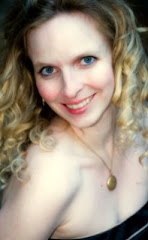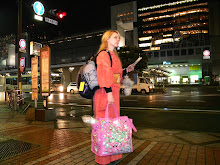
Since Joseph had plans for soon selling his motorcycle and leaving the country, he was quite keen on taking his bike for a road trip to the Boryeong Mud Festival. I also wanted to go to Boryeong. I was not, however, so keen on the prospect of motorcycling there. I shovelled pho and crisp bean sprouts in my mouth over a late breakfast and worried aloud about falling off the bike and meeting an untimely demise.
Do you realize that my mother will kill me if I die on a motorcycle? I asked him. No, I amended, my mother will kill you if I die on the motorcycle.
Joseph didn't appear overly concerned about either of our imminent deaths and even seemed quite confident I would not fall off the bike, stating that it simply was not possible unless I physically pushed myself off it. I, however, more fully realizing the range to which my clumbsiness can extend, had visions of myself lying mangled on the side of the road and looking up at Joseph, using my last gasps of breath to form those four little words that everyone loves to say but hates to hear: I. Told. You. So.
Part of the journey to Boryeong, which lay on the southeast coast of Korea, was through crowded cities, where Joseph would weave the bike through gridlocks of cars before stoplights, like a game of vehicular tetrus. In between the cities were, inevitably, highways and freeways through the country. Flying down the long, empty stretches of freeway terrified me, and at those times, I clung to my poor friend.
I don't understand it, Joseph said. When we're going through the city streets and massive waves of cars are unpredictably changing lanes at the same time, you don't bat an eye, but when we go 90 km an hour down a clear country road, you cling to me.

My hold on the bike, or rather, its driver, depended entirely on my level of fear at any particular moment. If I was relaxed, my hands would rest loosely by his sides; if I was scared, they would be wrapped tightly around his waist. My riding style was less that of a Hell's Angel and more that of a barnacle.
We passed by lovely, but largely unchanging, scenery. Korea is filled with clusters of mountains, in rich, earthy shades of emerald and jade. The countryside is also full of rice paddies, where the plants are arranged into perfectly-formed rows inside neat squares. I watched the silky, bright green rice plants ripple in the wind as we flew past them.
At one point, our road ran parallel to a train track that had a train steaming down it. We went faster and faster, first gaining, and then beating the train's pace. Do not race the train, I told Joseph. But I did not tell him that until after we'd come to a stoplight, after we'd "won" the game as far as we could play it. Secretly, I liked racing the train. I was terrified, yes, but also exhilarated.
We took the motorcycle from Seoul to Boryeong with the vague idea that the trip would take us 2 or 3 hours. It took us 6 hours, but finally, we arrived. After locating the festival grounds, we parked the bike, passed under the cartoonish arches, and discovered -- that the mud was closed.
How is this possible? I wondered outloud. How can anyone possibly close mud? It's just . . . mud. It's inconceivable!
I do not think that word means what you think it means,* Joseph responded as we looked about at the dismal, now empty mud pits and the few dirty stragglers who had apparently made it to the festival in time but had not yet left.
What do we do? we asked each other, and quickly determined swimming was the penultimate option. The ocean was only a few feet from the festival grounds, and aside from a wash of mismatched flip-flops and empty soju bottles left by careless mudfest revelers, it looked like it would make for a nice swim.
Nobody else is swimming, Joseph observed. That's so lame.
We waded about 5 feet off the shore and then heard loud whistles and the orange-suited Boryeong policeman, who were patrolling the sands, sternly waved us back to shore.

The ocean was closed as well. It's a wonder they don't try to turn off the sun, I thought to myself.
Wandering around the festival area, we found a partially-deflated rubber pit that still had about 3 inches of mud in the bottom.
Well, said Joseph reflectively, I've always wanted to lie in a big pool of mud.
So we laid back in it, looking up at the bright blue sky streaked with wispy white clouds. It was surprisingly peaceful. And predictably gross.
I began laughing. When Joseph asked why, I tried to explain. This whole trip. Us. We could be an indie movie right now, having spent 6 hours on a motorcycle to miss the festival and end up laying in a deflated pit of mud.
You don't understand, Joseph replied. This is my life.

We left the pit with the grey clay mud painted across our legs and backs, indiscriminately streaked across our faces, and clumped into locks of our hair in true rastafarian style. We walked to the edge of the ocean and looked into its forbidden blue expanse, the curling white-tipped waves rushing toward us.
You know, said Joseph, I reckon it will take them at least 30 seconds to pull us out from the water. Are you ready to run? On the count of three: One, two, three . . .

---------------------------------------------------------------------------------
*Lies: Our actual dialogue did not quote The Princess Bride, but a transcript of the entire 10 minute conversation pondering why/where/how all the mud had disappeared is just tedious. All other dialogue is more or less accurate.



No comments:
Post a Comment